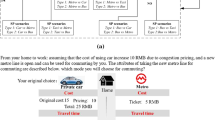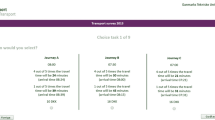Abstract
An increasing number of papers are focusing on integrating psychological aspects into the typical discrete choice models. The majority of these studies account for several latent effects, but they mainly focused on the direct effect of attitudes, perception, and norms in the discrete choice. None of them consider the effect of intention and its role as mediator between those psychological effects and the choice, as implied in the Theory of Planned Behavior. In this paper we contribute to the literature in this field by specifically studying the direct effect of the intention on the actual behavior, while attitude, social norms, and perceived behavioral control affect the intention to behave in a given way. We apply a hybrid choice model to study the departure time choice. For this, we use data from Danish commuters in the morning rush hours in the Greater Copenhagen area. We find a significant effect of the intention to arrive at work on time on the departing time choice, and also a significant effect of the lower level mediators on intention. Furthermore, the attitude toward short travel time is also significant in explaining the departure time choice. Finally, in terms of forecasting, we find that individuals who have a strong intention to be at work on time will be less likely to reschedule their departure time. This suggests that campaigns targeting the working culture could affect the subject norms among colleagues, which in turn influence individuals’ intention to be on time or to reschedule to a less congested time slot.







Similar content being viewed by others
Notes
There are several interesting studies in other fields than transport, but we chose to focus only on the transport literature as it provides sufficient evidence for the objective of this paper.
References
Ajzen, I.: From intentions to actions: A theory of planned behavior. In: Kuhl, J., Beckmann, J. (eds.) Action Control: From Cognition to Behavior, pp. 11–39. Springer, Heidelberg (1985)
Ajzen, I.: The theory of planned behavior. Organ. Behav. Hum. Decis. Process. 50(2), 179–211 (1991)
Arellana, J.: Modelos De Elección De La Hora De Inicio De Viaje (PhD Dissertation), Pontificia Universidad Católica De Chile Escuela De Ingeniería (2012)
Bahamonde-Birke, F., Kunert, U., Link, H., de Dios Ortúzar, J.: About attitudes and perceptions—finding the proper way to consider latent variables in discrete choice models. Presented at the 3rd Symposium of the European Association for Research in Transportation, Institute of Transportation Studies, University of Leeds, Leeds, UK (2014)
Bamberg, S.: Understanding and promoting bicycle use—insights from psychological research. In: Parkin, J. (ed.) Cycling and Sustainability, pp. 219–246. Emerald Publishing Group Limited, Bingley (2012)
Ben-Akiva, M., Mcfadden, D., Train, K., Walker, J., Bhat, C., Bierlaire, M., Bolduc, D., Boersch-Supan, A., Brownstone, D., Bunch, D.S., Daly, A., De Palma, A., Gopinath, D., Karlstrom, A., Munizaga, M.A.: Hybrid choice models: progress and challenges. Mark. Lett. 13(3), 163–175 (2002a)
Ben-Akiva, M., Walker, J.L., Bernadino, A.T., Gopinath, D., Morikawa, T.: Integration of choice and latent variable models. In: Majmassani, H.S. (ed.) Perpetual Motion: Travel Behaviour Research Opportunities and Application Challenges, pp. 431–470. Elsevier, Amsterdam (2002b)
Ben-Akiva, M., de Palma, A., McFadden, D., Abou-Zeid, M., Chiappori, P., de Lapparent, M., Durlauf, S.N., Fosgerau, M., Fukuda, D., Hess, S., Manski, C., Pakes, A., Picard, N., Walker, J.: Process and context in choice models. Mark. Lett. 23(2), 439–456 (2012)
Bierlaire M.: PythonBiogeme: a short introduction. Report TRANSP-OR 160706, Series on Biogeme. Transport and Mobility Laboratory, School of Architecture, Civil and Environmental Engineering, Ecole Polytechnique Fédérale de Lausanne, Switzerland (2016)
Cherchi, E., Meloni, I., de Dios, Ortúzar J.: The latent effect of inertia in the modal choice. In: Roorda, M.J., Miller, E.J. (eds.) Travel Behaviour Research: Current Foundations, Future Prospects, Chapter 23, pp. 517–534. Lulu.com Publishers, Morrisville (2014). ISBN 978-1-304-71517-3
Chorus, C.G., Kroesen, M.: On the (im-)possibility of deriving transport policy implications from hybrid choice models. Transp. Policy 36, 217–222 (2014)
Daly, A., Hess, S., Patruni, B., Potoglou, D., Rohr, C.: Using ordered attitudinal indicators in a latent variable choice model: a study of the impact of security on rail travel behaviour. Transportation 39(2), 267–297 (2012)
Fishbein, M., Ajzen, I.: Belief, Attitude, Intention, and Behavior: An Introduction to Theory and Research. Addison-Wesley, Reading (1975)
Fjellinjen: Oslo bomring: betaling og priser [Homepage of www.fjellinjen.no]. http://www.fjellinjen.no/Betaling-og-priser/ (2015)
Fujii, S., Gärling, T.: Applicarion of attitude theory for improved predictive accuracy of stated preference methods in travel demand analysis. Transp. Res. Part A Policy Pract. 37, 389–402 (2003)
Gärling, T., Gillholm, R., Gärling, A.: Reintroducing attitude theory in travel behavior research: the validity of an interactive interview procedure to predict car use. Transportation 25, 129–146 (1998)
Glerum, A., Stankovikj, L., Themans, M., Bierlaire, M.: Forecasting the demand for electric vehicles: accounting for attitudes and perceptions. Transp. Sci. 48(4), 483–499 (2014)
Haustein, S., Hunecke, M.: Reduced use of environmentally friendly modes of transportation caused by perceived mobility necessities: an extension of the theory of planned behavior. J. Appl. Soc. Psychol. 37(8), 1856–1883 (2007)
Johansson, M.V., Heldt, T., Johansson, P.: The effects of attitudes and personality traits on mode choice. Transp. Res. Part A Policy Pract. 40(6), 507–525 (2006)
Kahneman, D.: Maps of Bounded Rationality: A Perspective on Intuitive Judgment and Choice. Nobel Prize Lecture, Stockholm, Sweden (2002)
Kamargianni, M., Ben-Akiva, M., Polydoropoulou, A.: Incorporating social interaction into hybrid choice models. Transportation 41(6), 1263–1285 (2014)
McFadden, D.: Disaggregate behavioural travel Demand’s RUM Side. A 30-year retrospective. In: Hensher, D.A. (ed.) Travel Behaviour Research: The Leading Edge. Pergamon Press, Oxford (2000)
Paulssen, M., Temme, D., Vij, A., Walker, J.L.: Values, attitudes and travel behavior: a hierarchical latent variable mixed logit model of travel mode choice. Transportation 41, 873–888 (2014). https://doi.org/10.1007/s11116-013-9504-3
Raveau, S., Alvarez-Daziano, R., Francisca Yáñez, M., Bolduc, D., de Dios Ortúzar, J.: Sequential and simultaneous estimation of hybrid discrete choice models some new findings. Transp. Res. Rec. 2156, 131–139 (2010)
Sheppard, B.H., Hartwick, J., Warshaw, P.R.: The theory of reasoned action: a meta-analysis of past research with recommendations for modifications and future research. J. Consum. Res. 15, 325–343 (1988)
Small, K.A.: The scheduling of consumer activities: work trips. Am. Econ. Rev. 72(3), 467–479 (1982)
Temme, D., Paulssen, M., Dannewald, T.: Incorporating latent variables into discrete choice models—a simultaneous estimation approach using SEM software. Bus. Res. 1(2), 220–237 (2008)
Thorhauge, M., Cherchi, E., Rich, J.: The effect of perceived mobility necessity in the choice of departure time. The Transportation Research Board (TRB) 93rd Annual Meeting, Washington D.C. (2014a)
Thorhauge, M., Cherchi, E., Rich, J.: Building efficient stated choice design for departure time choices using the scheduling model: Theoretical considerations and practical implications. Aalborg Trafikdage, Aalborg (2014)
Thorhauge, M., Cherchi, E., Rich, J.: How flexible is flexible? Accounting for the effect of rescheduling possibilities in choice of departure time for work trips. Transp. Res. Part A Policy Pract. 86, 177–193 (2016a)
Thorhauge, M., Haustein, S., Cherchi, E.: Psychology meets microeconomics: accounting for the Theory of Planned Behaviour in departure time choice. Transp. Res. Part F Traffic Psychol. Behav. 38, 94–105 (2016b)
Transportstyrelsen: Trangselskatt i Stockholm: Tider och belopp i Stockholm [Homepage of www.transportstyrelsen.se]. https://www.transportstyrelsen.se/sv/vagtrafik/Trangselskatt/Trangselskatt-i-stockholm/Tider-och-belopp-i-Stockholm/ (2015a)
Transportstyrelsen: Trangselskatt i Göteborg: Tider och belopp i Goteborg [Homepage of www.transportstyrelsen.se]. http://www.transportstyrelsen.se/sv/vagtrafik/Trangselskatt/Trangselskatt-i-goteborg/Tider-och-belopp-i-Goteborg/ (2015b)
Tudela, A., Habib, K.M.N., Carrasco, J.A., Osman, A.O.: Incorporating the explicit role of psychological factors on mode choice: A hybrid mode choice model by using data from an innovative psychometric survey. In: Second International Choice Modeling Conference, Leeds (2011)
Vij, A., Walker, J.L.: Integrated choice and latent variable models: holy grail, or not? In: International Choice Modelling Conference 2015, Austin, Texas (2015)
Walker, J., Ben-Akiva, M.: Generalized random utility model. Math. Soc. Sci. 43(3), 303–343 (2002)
Yáñez, M.F., Raveau, S., de Dios Ortúzar, J.: Inclusion of latent variables in Mixed Logit models: modelling and forecasting. Transp. Res. Part A Policy Pract. 44(9), 744–753 (2010)
Zhao, J.: Preference Accommodating and Preference Shaping: Incorporating Traveler Preferences into Transportation Planning (PhD Dissertation), Massachusetts Institute of Technology (2009)
Acknowledgements
The first author wishes to thank several transportation students at UC Berkeley for their help and useful discussions throughout the development of the HCM during his visit at UC Berkeley. A particular thank to Akshay Vij for his comments on the use of the latent constructs in prediction. In addition, we would like to thank Sonja Haustein for her help on designing the psychological components. Furthermore, early versions of this paper were presented at the 3rd Symposium of the European Association for Research in Transportation (hEART2014) and the Transportation Research Board (TRB 2016) 95th annual meeting.
Author information
Authors and Affiliations
Corresponding author
Ethics declarations
Conflict of interest
On behalf of all authors, the corresponding author states that there is no conflict of interest.
Rights and permissions
About this article
Cite this article
Thorhauge, M., Cherchi, E., Walker, J.L. et al. The role of intention as mediator between latent effects and behavior: application of a hybrid choice model to study departure time choices. Transportation 46, 1421–1445 (2019). https://doi.org/10.1007/s11116-017-9839-2
Published:
Issue Date:
DOI: https://doi.org/10.1007/s11116-017-9839-2




